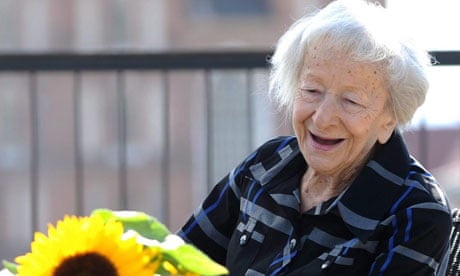Polish poet and Nobel laureate Wislawa Szymborska, whose beguilingly simple, playful poems spoke to the heart of everyday life, died yesterday aged 88.
Described by the Nobel committee as the "Mozart of poetry" but with "something of the fury of Beethoven" – and by an Italian newspaper as the "Greta Garbo of World Poetry" – Szymborska died in her sleep from lung cancer, said her personal secretary Michal Rusinek.
Speaking on Wednesday, Poland's president Bronislaw Komorowski called her the country's "guardian spirit". Her poems "were brilliant advice, through which the world became more understandable", he said; they showed the importance of finding value "in the daily bustle".
Born in the Polish village of Bnin in 1923, Szymborska moved to Krakow eight years later and lived there until her death. She studied Polish philology and sociology at the city's university, and published her first poem in March 1945, "Szukam slowa" (I am Looking for a Word), in the daily Dziennik Polski. Her first collection, That's What We Live For (1952), was written under Poland's communist regime and was an expression of socialist realism; she later renounced the Stalin-era verse of her first two books, going on to mock communism in later collections. Her writing, always accessible, which by her death stretched to around 400 poems, was known and loved across Poland, often learned by heart, with "Cat in an Empty Apartment" recited across the country.
Despite her popularity, Szymborska shied away from the public eye, telling the Guardian in 2000 that "there's simply too much fuss about myself".
"Everyone needs solitude, especially a person who is used to thinking about what she experiences. Solitude is very important in my work as a mode of inspiration, but isolation is not good in this respect. I am not writing poetry about isolation," she said, going on to wonder why anyone would want to interview her. "For the last few years my favourite phrase has been 'I don't know'. I've reached the age of self-knowledge, so I don't know anything. People who claim that they know something are responsible for most of the fuss in the world."
She took the Nobel in 1996 despite having published only 200 or so poems: she was praised by the committee for her poetry "that with ironic precision allows the historical and biological context to come to light in fragments of human reality".
In her Nobel speech, she spoke of the extraordinary nature of life, of how she would love to tell Ecclesiastes that "'There's nothing new under the sun': that's what you wrote, Ecclesiastes. But you yourself were born new under the sun", and of how, "in the language of poetry, where every word is weighed, nothing is usual or normal. Not a single stone and not a single cloud above it. Not a single day and not a single night after it. And above all, not a single existence, not anyone's existence in this world."
Szymborska wrote whenever she was able, right until her death, said Rusinek on Polish television. A new book is to be published later this year.

Comments (…)
Sign in or create your Guardian account to join the discussion